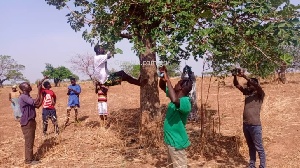- Home - News
- Elections 2024
- News Archive
- Crime & Punishment
- Politics
- Regional
- Editorial
- Health
- Ghanaians Abroad
- Tabloid
- Africa
- Religion
- Photo Archives
- Press Release
General News of Friday, 18 April 2025
Source: www.ghanawebbers.com
Searching for mobile phone signal – How Sanguli residents struggle with poor network
On a bright Sunday afternoon in Sanguli, residents gather under a tree. They call it “MTN,” not for shade, but for mobile signal.
In today's digital world, this spot is vital for the community. They desperately want to stay connected.
Esther (not her real name) shared her struggles with Graphic Online’s Simon Unyan. She often paddles several kilometers to Saboba town to send money. When her bicycle breaks down, she spends GH¢30 on transport.
“Even to receive a MoMo alert, we must travel to a nearby village,” she said. These journeys are risky and dangerous due to rocky roads.
Community leader Nkunkpakikpe Dalafu recalled a tragic case. A pregnant woman lost her baby because she couldn’t call for help.
“We’ve seen women lose pregnancies and suffer complications due to poor signals,” he said. He also mentioned at least 15 snakebite cases from residents searching for signals at night.
Poor network coverage affects education too. Teachers often refuse postings in Sanguli due to connectivity issues. This disrupts academic progress and limits students’ futures.
Gmajinbo Daniel, a university graduate from the area, missed a job opportunity because recruiters couldn't reach him. “I had to rent a room in Saboba just to stay connected,” he said.
For youth, the digital gap means missing out on banking and online learning opportunities. It stifles economic growth and deepens poverty cycles.
The social consequences are severe as well. Mabefam Konja shared that her son’s relationship is struggling due to poor communication with his girlfriend in Saboba.
“They only talk on market days when he travels there,” she explained. Now, she’s seeing someone else because of their lack of contact.
Marital tensions are rising too. Hours spent searching for signals lead to misunderstandings and suspicions of infidelity among couples.
“Some spouses get suspicious when they see their partners talking while waiting for signals,” another resident noted.
Dalafu Emmanuel highlighted the absence of a modern network tower between Saboba and Chereponi. This gap disrupts communication and emergency responses during accidents along that stretch.
“Getting emergency help is challenging here,” he lamented. Farmers struggle without reliable access during farming seasons; much produce rots on the farm as a result.
The Sanguli Electoral Area has about 17 communities facing weak or non-existent mobile coverage. This affects healthcare access, education, commerce, and family life.
Despite the government’s rural telephony project, proximity to Togo worsens connectivity issues. Phones often switch to Togocel's network, making calls difficult and expensive.
Residents tie phones to tree branches or climb trees at odd hours for better signals. When they do connect, calls are made on speaker mode due to poor reception—sacrificing privacy just to communicate.
Tilako Timugnee Francis, assemblyman for Sanguli Electoral Area, expressed frustration over little change despite repeated appeals for help. A temporary rural network booster remains uninstalled by the district assembly.
“Even with planned interventions, connectivity remains uncertain,” he said. “We’re still waiting for permanent solutions.”
He mentioned that materials were once brought in but turned out only temporary fixes were provided instead of sustainable solutions near Togo's border where lights can be seen at night.
He urged the government and telecom operators to build a permanent tower for stable connections without foreign interference.
The Ghana Investment Fund for Electronic Communications (GIFEC) aims to expand telecom access but communities like Sanguli remain disconnected.
Residents plead urgently for action; connectivity is essential for safety and dignity.
Sanguli’s story highlights that many rural areas still lack basic digital access.
As Ghana pushes towards digital transformation, Sanguli remains excluded from mobile banking or e-learning opportunities.
The people of Sanguli simply ask for what many take for granted: the right to connect.











